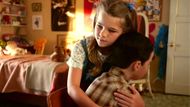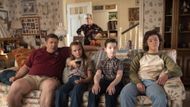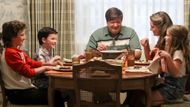Young Sheldon, a The Big Bang Theory spin-off, played a really big role in how the audience saw Sheldon’s character and his family. When CBS announced the prequel to The Big Bang Theory, viewers assumed that it would be an extension of the boy wonder character, who was misunderstood and had oddities here and there. However, the prequel turned out to be so much more than just a deep dive into young Sheldon’s character.
It was a family-style comedy with just enough drama in it to keep the audience entertained. Young Sheldon changed the way audiences viewed Sheldon and his family in The Big Bang Theory, for the better.
Here are 5 ways the prequel impacted the audience’s understanding of Sheldon and his family.
How Young Sheldon changed the view of Sheldon's family
Young Sheldon brilliantly explores Sheldon’s growth surrounded by his family, which made him the man that we see in The Big Bang Theory.
George Sr. wasn't as bad as The Big Bang Theory portrayed him to be

he biggest way that Young Sheldon has impacted Sheldon’s family’s image has to be through George Sr.‘s character. Throughout The Big Bang Theory, Sheldon’s dad is portrayed through Sheldon’s (and sometimes his mom’s) lens as a father who cheated on his mom, didn’t try to understand his kid, and was generally not a good father.
However, Young Sheldon turned this whole image of George Sr. around into a father who was trying to do his best by his kids—one of whom was socially inept and sometimes landed them in situations hard for them to handle. George Sr. tried very hard to connect with all three of his kids, who were all very different, and he cared very deeply about his family.
Missy was more than just the good-looking, socially adept twin that The Big Bang Theory introduced us to

The Missy we were introduced to in The Big Bang Theory was just the good-looking, socially adept twin who, when placed next to Sheldon, was an example of everything that Sheldon was not. She served as a punchline for the ongoing joke about Sheldon’s oddities.
Young Sheldon, however, portrayed a complex and emotional kid who was often ignored unconsciously because her parents had to focus on her socially inept twin, who struggled in the world. But she had struggles of her own, despite which she grew into a smart, strong, and kind-hearted kid. There are so many montages in the show where Missy is the one who consoles Sheldon as he struggles to make sense of the world—despite the fact that their parents prioritized Sheldon’s needs over hers most of the time.
Sheldon's relationship with his brother Georgie

Throughout most of The Big Bang Theory, the audience has no idea that Sheldon even has a brother. Sheldon even tries extremely hard not to invite his own brother to his wedding in the penultimate season of the show, but he ultimately does. That event itself helps hint at healing in their relationship, which Young Sheldon explores more deeply.
Young Sheldon, on the other hand, beautifully explored how close-knit this family was. Even though Georgie didn’t understand his brother or his world, he stood by him and supported him in the moments when Sheldon needed him most. The beauty of the show lay in the way it brought together a group of people who might not understand each other’s worlds, but in the moments when it mattered the most, this family came together.
The Coopers of Young Sheldon are just better

It’s not like The Big Bang Theory portrayed Sheldon’s family as an awful group of people who Sheldon had to escape from—except his sweet old Meemaw (or is she?). But, from Sheldon’s lens, where people didn’t understand him (rather than it ever being the other way around), his family wasn’t that great.
But Young Sheldon still had the naivete of a child. Add to it a child who knew more than the people around him in many ways, but also so much less in other ways. This helped the show create an environment where they could build complex characters with their own life experiences.
Sheldon himself in Young Sheldon

One of the ways that Young Sheldon changed how Sheldon’s family is viewed is through Sheldon himself. In The Big Bang Theory, Sheldon was a grown adult, but he still had so much more to learn about the world emotionally. The prequel, on the other hand, is narrated by a much older version of The Big Bang Theory’s Sheldon, who is himself a parent now. The time and distance that Sheldon has had from his childhood—and the added perspective of his own growth as an individual—helped him view his family in a much softer light in Young Sheldon.
Keep following Soap Central for more such pieces!
